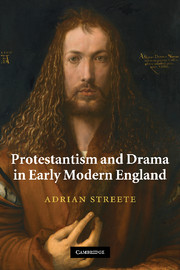Book contents
- Frontmatter
- Contents
- Acknowledgements
- Introduction
- PART I
- 1 Christ, subjectivity and representation in early modern discourse
- 2 Locating the subject: Erasmus and Luther
- 3 Representing the subject: Calvin, Christ and identity
- 4 Perception and fantasy in early modern Protestant discourse
- PART II
- Afterword
- Notes
- Bibliography
- Index
1 - Christ, subjectivity and representation in early modern discourse
Published online by Cambridge University Press: 11 March 2010
- Frontmatter
- Contents
- Acknowledgements
- Introduction
- PART I
- 1 Christ, subjectivity and representation in early modern discourse
- 2 Locating the subject: Erasmus and Luther
- 3 Representing the subject: Calvin, Christ and identity
- 4 Perception and fantasy in early modern Protestant discourse
- PART II
- Afterword
- Notes
- Bibliography
- Index
Summary
And as wee haue borne the image of the earthy, so shall we beare the image of the heauenly.
(1 Corinthians 15:49)According to one of the most influential and well known critical accounts, early modern Protestant theology is characterised by the way in which it institutes a more interior and immediate form of religious experience than had previously been the case. It was not that Catholics did not experience religion inwardly but that, for their opponents, they did not experience religion inwardly enough. So as Alan Sinfield observes: ‘Protestants were not content with casual or external observance [and] … the mediatory functions by which the church had traditionally interposed itself – saints, the Latin Bible and ritual, the priest, indulgences.’ From now on, religious engagement was to be predicated upon man's immediate relationship with the divine, a relationship unencumbered by false mediators and contrasted with Catholic practice. This experience of interiority was re-formed both in a religious and in a cultural sense. In Protestant theology, man and God are placed at opposite and opposing ends of the metaphysical spectrum. Once the subject examines himself or herself in relation to the magnificent and austere Protestant deity, he or she is almost inevitably found wanting. The consequence of this move, argues Sinfield, is a strange kind of paradox. He notes: ‘The protestant determination to create a more immediate relationship between humanity and God placed a vast and uncertain gulf between them.
- Type
- Chapter
- Information
- Protestantism and Drama in Early Modern England , pp. 33 - 57Publisher: Cambridge University PressPrint publication year: 2009



